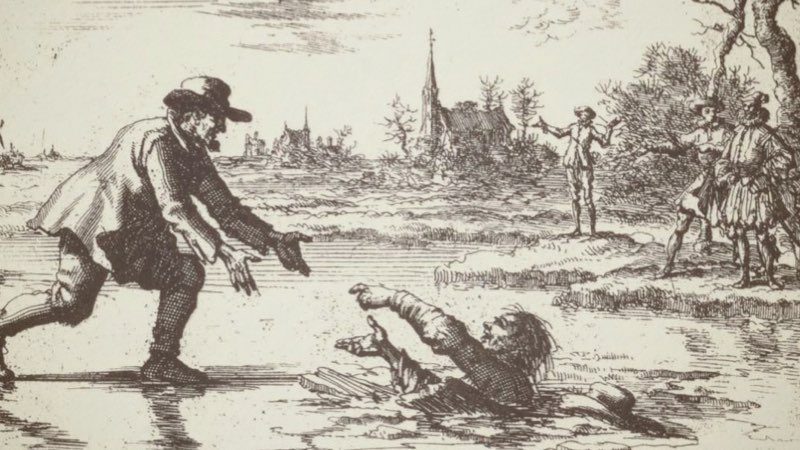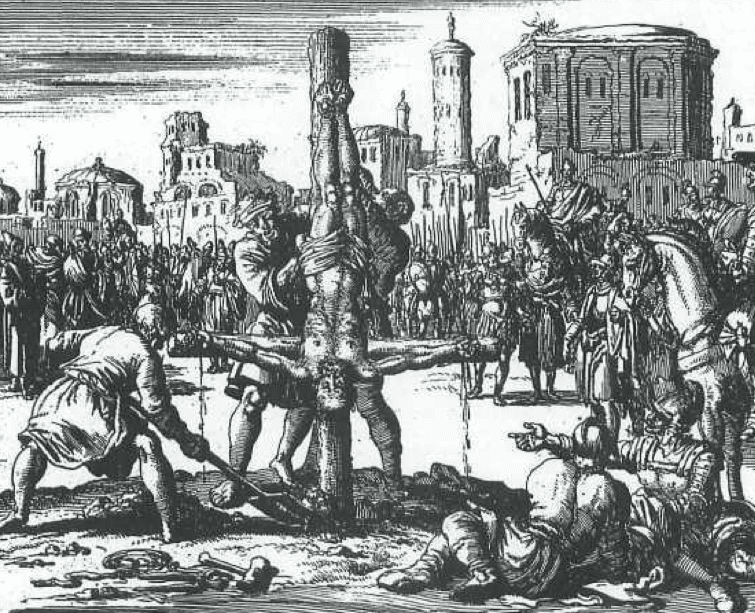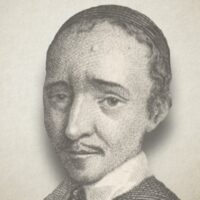
30. The Apostle Peter
The Apostle Peter being crucified upside down in Rome on orders of Nero, AD 69
Simon Peter, the Holy Apostles, Crucified with His Head Downward, Under Emperor Nero, A.D. 69
Simon Jona, afterwards called Cephas in Syriac, but Petros or Petrus in Greek, was the brother of Andrew, a native of Bethsaida in Galilee, and a fisherman by occupation. He had his abode at Capernaum, with his wife’s mother. His brother Andrew, who was a disciple of John, first brought him to Christ, and shortly afterwards he and his brother were called away from the fishery, to become fishers of men. Matt. 16:17; Mark 3:16: John 1:42; Matt. 4:18; John 1:44; Luke 4:31, 38; John 1:41, 42; Matt. 4:18, 19.
He was diligently instructed by Christ, his Saviour, and made such progress therein, that he became the spokesman of all the apostles, being generally the most frank in asking and answering, as well as the most zealous for Christ, in order to prove to Him his love and fidelity, although at times he manifested a certain rashness therein; on which occasions the Lord, like a father his child, faithfully instructed, and, whenever it was necessary, kindly reproved him. Matt. 16:16; John 6:68; Matt. 18:21; 14:31; John 18:10, 11.
The Lord loved him in a special manner, and permitted him, together with James and John, to witness His glory on Mount Tabor; of which He afterwards made mention to the chosen scattered strangers, saying, We were eyewitnesses of his majesty. Matt. 17:1-3; II Pet. 1:16, 17.
He was the boldest in offering to suffer with Christ, but the weakest when the conflict began, The Lord selected him and the two sons of Zebedee, to watch and pray with Him in the garden; but his eyes as well as those of the others were heavy with sleep; which showed that though he was specially loved by Christ, he was nothing more than a weak mortal. Matt. 26:33, 36.
About his denying Christ we shall not mention anything, as this is not the proper place for it, since we purpose to speak only of his faithfulness and steadfastness until death.
After the aforesaid denial, the Lord forgave him his sin, and commanded him three times to feed His sheep and lambs; which he subsequently faithfully did to the full extent of his ability. John 21:15,16; 1 Pet. 5:1-3.
In one day there were converted to the faith, by his preaching, about three thousand souls; all of whom were baptized, and continued steadfastly in the apostles’ doctrine and fellowship, and in breaking of bread, and in prayers. Acts 2:41,42.
He confirmed his doctrine through the power of God by signs accompanying the same, according to the promise of Christ, as is evidenced in the case of the lame man, Ananias, Sapphira, Eneas, Tabitha, and others. Acts 3:7; 5:5,10; 9:34,40.
The calling of the Gentiles was revealed to him in a vision from heaven; but as he was properly an apostle of the Jews, his ministry was most effectual among the circumcision. Acts 10:10-12; Gal. 2:8.
But since he was so excellent and worthy a man in his ministry, it pleased the Lord, that he should also be one of His martyrs, to seal the truth of His doctrine not only with the mouth, but also with his blood, yea, even with his death. This the Lord showed to him shortly before His departure from this world, saying, “Verily, verily, I say unto thee, when thou wast young, thou girdedst thyself, and walkedst whither thou wouldest: but when thou shalt be old, thou shalt stretch forth thy hands, and another shall gird thee, and carry thee whither thou wouldest not. This spake he, signifying by what death he should glorify God” (John 21:18, 19).
This was verified in him, for shortly afterwards he and John, his fellowhelper, were brought before the Jewish council in Jerusalem, and severely threatened, to desist preaching in the name of Jesus; to which they both boldly replied, “Whether it be right in the sight of God to hearken unto you more than unto God, judge ye” (Acts 4:19).
Afterwards he was again apprehended, together with the other apostles, but by night, miraculously delivered out of prison by an angel. Acts 5:19.
After that he was not only apprehended, but, together with the other apostles, scourged and commanded, that they should absolutely not preach in the name of the Lord Jesus; but they went away from the Council, rejoicing that they were counted worthy to suffer shame for His name. Acts 5:40-42.
Afterwards King Herod stretched forth his hands to vex certain of the church. And he killed James the brother of John with the sword. And when he saw it pleased the Jews, he proceeded further and apprehended Peter also, and put him in prison, and delivered him to four quaternions of soldiers; intending after Easter to bring him forth to the people. But in the night the angel of the Lord led him out, through the midst of the soldiers, so that he returned to the believers, who rejoiced greatly on account of him. Acts 12:1.
Finally there was fulfilled, according to the testimony of history, the prediction of Christ, that he should glorify God by his death; for while he was at Rome, he was sentenced by the Emperor Nero to be crucified. But, esteeming himself unworthy to be crucified with his head upward, like his Saviour, he requested to be crucified with his head downward; which he easily obtained, for the tyrants were forthwith willing and ready to increase his pain.
This occurred, as is stated, after Peter had preached the Gospel for thirty-seven years, and when he was seventy years old. Euseb. lib. 2. cap. 25. and 3. cap. 2. from the writings of Origen. Egesipp. Hist, oj the miserable Destruction of the City oj Jerusalem*. 3d book, 2d chap. Also, Konst- tooneel van vecrtig heerlijke afbeeldingen Christi en sijncr Apostelen, door N. D. C, printed Anno 1609, in the Life of Peter. Also, W. Baudart Apophthegm. Christian, lib. 1. super Petrum. ex Hieron. de Vitis Illustribus. Johon. Strac. in Festo. Joh. Evang. Ambr. ad Aux.
[The historians state that the apostle Peter wept very much daily after the ascension of Christ. When he was asked why he wept so much, he replied, “Desiderio Domini,” that is, “Because I very much long for my Lord.” There are ancient writers who state that Peter cried every time he heard a cock crow. When he saw his beloved wife being led out, to be put to death, on account of having confessed the faith, be addressed her in these words, “O my beloved wife! have the Lord Jesus always before thine eyes; this is the marriage of the saints.” He was sentenced to be crucified in the usual manner. But he requested to be hung on the cross with his feet up, saying, “I am not worthy to be hung on the cross, like the Son of God hung and suffered on it.”—W. Baudart. Apophthegm printed Anno 1640, first book, page 2.]Thieleman J. Van Braght (1625-1664) was an Anabaptist who is best known for writing a history of the Christian witness throughout the centuries entitled “The Bloody Theater or Martyrs Mirror of the Defenseless Christians who baptized only upon confession of faith, and who suffered and died for the testimony of Jesus, their Saviour, from the time of Christ to the year A.D. 1660” (1660).
Thieleman J. Van Braght, Martyrs Mirror





